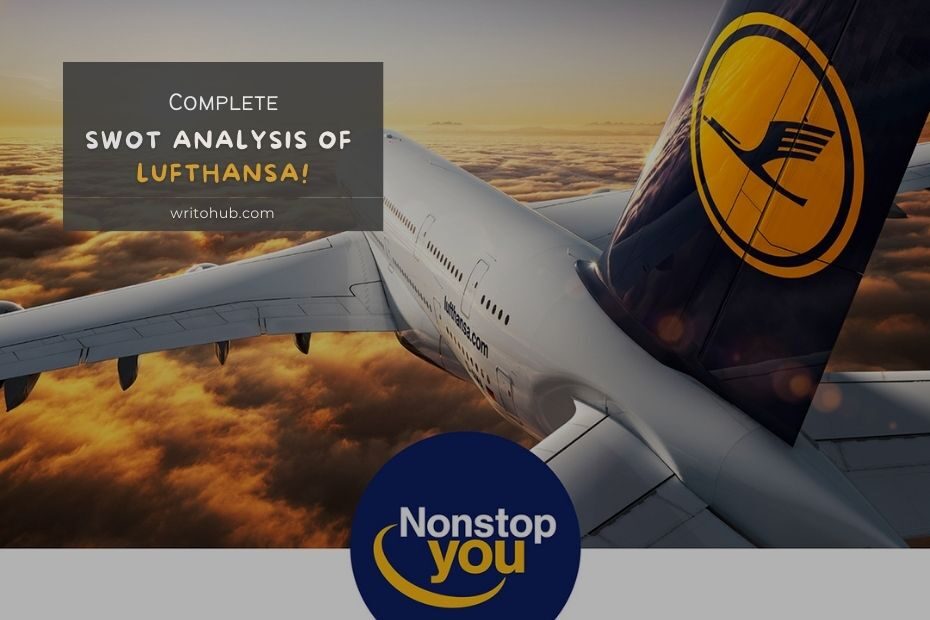Lufthansa, founded in 1953, is one of the largest and most established airlines in Europe, offering passenger and cargo services across the globe.
Conducting a SWOT analysis of Lufthansa allows us to evaluate its internal strengths and weaknesses, as well as external opportunities and threats.
This analysis provides insights into Lufthansa’s current market position and helps identify strategic areas for growth and improvement.
Strengths in the SWOT Analysis of Lufthansa
- Strong Brand and Reputation: Lufthansa enjoys a strong brand image and reputation for quality service, reliability, and safety. The airline’s long-standing history, extensive route network, and customer loyalty contribute to its positive brand perception.
- Extensive Global Network: Lufthansa operates an extensive global network, connecting passengers to numerous destinations across the globe. Its comprehensive route coverage and strategic alliances enable seamless travel options and connectivity.
- Strong Operational Capabilities: Lufthansa possesses strong operational capabilities, including efficient aircraft fleet management, maintenance services, and advanced IT systems. These capabilities contribute to the airline’s operational efficiency and customer satisfaction.
- Focus on Innovation: Lufthansa places a strong emphasis on innovation and continuously invests in technology to improve the customer experience. This includes initiatives such as improved in-flight entertainment systems, digital services, and enhanced customer interfaces.
- Diversified Business Segments: Lufthansa has diversified its operations into various business segments, including passenger transportation, cargo services, and aviation-related services. This diversification provides the airline with multiple revenue streams and a balanced portfolio.
Weaknesses in the SWOT Analysis of Lufthansa
- Cost Structure and Competitiveness: Lufthansa faces challenges related to its cost structure and competitiveness, particularly when compared to low-cost carriers. The airline needs to continuously optimize its cost base to remain competitive in price-sensitive markets.
- Unionized Workforce and Labor Disputes: Lufthansa’s large and unionized workforce can lead to labor disputes and strikes, resulting in operational disruptions and negative customer experiences. Effective labor relations management is crucial for maintaining smooth operations.
- Dependence on Hub Operations: Lufthansa’s operations heavily rely on its hub airports, such as Frankfurt and Munich. Any disruptions or capacity constraints at these hubs can impact the airline’s operations and connectivity.
- Environmental Impact and Sustainability: Like other airlines, Lufthansa faces increasing pressure to address its environmental impact and adopt sustainable practices. Compliance with environmental regulations and the need to invest in eco-friendly technologies can pose challenges.
Opportunities in the SWOT Analysis of Lufthansa
- Expansion in Emerging Markets: Lufthansa has opportunities to expand its presence in emerging markets with growing air travel demand. By establishing partnerships, adding new routes, and tailoring services to meet local needs, Lufthansa can tap into these markets.
- Growth in Premium Travel Segment: The demand for premium travel experiences is increasing. Lufthansa can capitalize on this trend by enhancing its premium offerings, including exclusive lounges, personalized services, and luxury amenities.
- Alliances and Partnerships: Collaborating with other airlines through alliances and partnerships can enhance Lufthansa’s global reach, connectivity, and customer loyalty. These collaborations allow for seamless transfers, shared frequent flyer programs, and coordinated schedules.
- Digital Transformation: Embracing digital technologies can streamline operations, enhance customer experiences, and drive cost efficiencies for Lufthansa. Investing in digital platforms, mobile applications, and data analytics can help the airline stay competitive in the digital era.
Threats in the SWOT Analysis of Lufthansa
- Intense Competition: Lufthansa faces intense competition from both legacy carriers and low-cost airlines, particularly in the European market. Price competition, capacity expansions, and aggressive marketing strategies by competitors can impact market share and profitability.
- Geopolitical and Economic Uncertainty: Geopolitical tensions, economic downturns, and currency fluctuations can disrupt travel demand and impact Lufthansa’s operations. Uncertainty surrounding Brexit, trade disputes, and global economic conditions pose risks to the airline’s financial performance.
- Regulatory and Security Challenges: Lufthansa operates in a highly regulated industry, facing challenges such as aviation regulations, security measures, and compliance requirements. Changes in regulations or security threats can lead to additional costs and operational disruptions.
- Technological Disruptions: Rapid advancements in technology, such as the rise of online travel agencies and alternative accommodation platforms, can disrupt the traditional airline industry. Lufthansa needs to adapt to changing consumer preferences and embrace digital innovation to stay competitive.
Conclusion
A SWOT analysis of Lufthansa highlights the airline’s strengths, weaknesses, opportunities, and threats in the aviation industry.
Lufthansa’s strong brand, extensive global network, operational capabilities, and focus on innovation position it well in the market.
Addressing challenges related to cost competitiveness, labor relations, hub dependence, and sustainability is crucial for the airline’s long-term success.
Seizing opportunities in emerging markets, premium travel segments, alliances, and digital transformation can drive Lufthansa’s growth and enhance customer satisfaction.
Mitigating threats from intense competition, geopolitical and economic uncertainty, regulatory challenges, and technological disruptions requires strategic planning and adaptation.
By leveraging its strengths, addressing weaknesses, capitalizing on opportunities, and navigating threats, Lufthansa can maintain its position as a leading European airline and continue to deliver exceptional travel experiences to its passengers.
